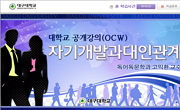The 21st century is a knowledge-based information society with advanced information and communications technology that enables rapid and organized transmission of vast information in the sea of increasing knowledge and information. Systematic and well...
http://chineseinput.net/에서 pinyin(병음)방식으로 중국어를 변환할 수 있습니다.
변환된 중국어를 복사하여 사용하시면 됩니다.
- 中文 을 입력하시려면 zhongwen을 입력하시고 space를누르시면됩니다.
- 北京 을 입력하시려면 beijing을 입력하시고 space를 누르시면 됩니다.
청소년의 사이버문화와 학습태도, 대인관계 및소비행동과의 관계 연구 = A Study on the Relations between Youths‘ Cyber Culture Learning Attitude, Interpersonal Relationships and Consumption Behaviors
한글로보기https://www.riss.kr/link?id=T10534150
- 저자
-
발행사항
춘천 : 강원대학교, 2006
-
학위논문사항
학위논문(석사) -- 강원대학교 교육대학원 , 학교상담전공 , 2006. 8
-
발행연도
2006
-
작성언어
한국어
- 주제어
-
발행국(도시)
강원특별자치도
-
기타서명
A Study on the Relations between Youths‘ Cyber Culture Learning Attitude, Interpersonal Relationships and Consumption Behaviors
-
형태사항
72p. 26cm
-
일반주기명
지도교수:안범희
참고문헌 : p. - 소장기관
-
0
상세조회 -
0
다운로드
부가정보
다국어 초록 (Multilingual Abstract)
The 21st century is a knowledge-based information society with advanced information and communications technology that enables rapid and organized transmission of vast information in the sea of increasing knowledge and information. Systematic and well-planned education is essential for successful survival in this information society.
As various types of multimedia content on new channels of communication feed our youths with different kinds of information and programs, the hope for democratic enjoyment of culture is essentially falling apart. Instead, concerns are raised in regards to Internet addiction, lack of interpersonal skills, social isolation, passive consumer culture, and widened generation gap due to Internet culture among the youths who are closely knitted to Internet culture.
Thus this study was aimed at analyzing the relations between cyber culture and youths‘ learning attitude, interpersonal relationships, and consumer behaviors in an attempt to understand the youth culture today and provide fundamental data to help their school and social life. For achieving the study objectives, surveys were conducted on middle school and high school students in Yeoju and Icheon areas.
The results could be summarized as below.
First, majority of the students were very familiar with the Internet as they have started using the Internet since 3 years ago or earlier. The most number of students responded that they use the Internet between 1 to 4 hours a week on average, and the students were found to use the Internet the most especially in the hours between 9 p.m. and midnight. Almost all respondents indicated that they use the Internet at home.
Second, the students used the Internet mainly for network games, followed by downloading MP3 files, browsing entertainment and sports information, and browsing educational information. They were also found to be actively involved in e-Commerce, chats, and online communities. The most frequent Internet activities included Cyworld, blogs, and cafes.
Third, involvement in cyber culture was found to affect learning interest the most, followed by learning confidence, and usefulness. Decreasing involvement in cyber culture would be the most important factor in enhancing the learning attitude of the students.
Fourth, involvement in cyber culture was found to have positive effects on expressions, social relationships, and personal roles. In other words, involvement in cyber culture is likely to cultivate hostile and rebellious social culture instead of independent and responsible interpersonal relationships that are friendly and social in nature. It is possible for such adverse youth culture to develop into negative expressions in many offline interpersonal relationships.
Fifth, involvement in cyber culture was found to have adverse effects on pursuing practicality, and have positive effects on pursuit of brands, pursuit of individuality, and pursuit of latest fashion. This shows that development of cyber culture serves as a platform for emphasizing the importance of fashion and brands in the context of domestic consumer culture.
Sixth, involvement in cyber culture was found to be relatively low for students whose parents rebuke them when they use the Internet beyond certain length of time. This implies that simply reprimanding the youths based on usage of the Internet would not be effective. Instead, it is important to understand the mindset of the youths and use appropriate methods to control their involvement in cyber culture.
In conclusion, the study showed that involvement in cyber culture has adverse effects on learning attitude and practical consumer behaviors, and encourages negative interpersonal relationships to a certain extent.
목차 (Table of Contents)
- Ⅰ 서 론 = 1
- 1. 연구의 필요성 및 목적 = 1
- 2. 연구문제 = 3
- Ⅱ. 이론적 배경 = 4
- 1. 인터넷과 사이버문화 = 4
- Ⅰ 서 론 = 1
- 1. 연구의 필요성 및 목적 = 1
- 2. 연구문제 = 3
- Ⅱ. 이론적 배경 = 4
- 1. 인터넷과 사이버문화 = 4
- 2. 사이버공간이 청소년에게 미치는 영향 = 8
- 3. 학습태도 = 11
- 1) 학습태도의 개념 = 11
- 2) 학습태도의 영향요인 = 12
- 4. 대인관계 이론 = 14
- 1) 대인관계의 개념 = 14
- 2) 대인관계 성향 = 16
- 5. 청소년의 소비행동 = 18
- 6. 선행연구의 개관 = 20
- Ⅲ. 연구방법 = 23
- 1. 연구대상 = 23
- 2. 측정도구 = 24
- 1) 사이버문화 척도 = 24
- 2) 학습태도 척도 = 24
- 3) 대인관계성향 척도 = 25
- 4) 소비행동 척도 = 26
- 3. 연구 절차 = 28
- 4. 자료의 처리 = 28
- Ⅳ. 연구 결과 및 분석 = 29
- 1. 연구대상의 특성 = 29
- 1) 연구대상의 기본적 특성 = 29
- 2) 연구대상의 인터넷 이용특성 = 30
- 2. 사이버문화 몰입과 학습태도와의 상관 = 33
- 3. 사이버문화 몰입과 대인관계성향의 상관 = 34
- 4. 사이버문화 몰입과 소비행동의 상관분석 = 35
- 5. 차이 분석 = 35
- 1) 사이버문화 몰입의 차이 = 35
- 2) 학습태도의 차이 = 37
- 3) 대인관계성향의 차이 = 41
- 4) 소비행동의 차이 = 44
- Ⅴ. 논의 = 48
- Ⅵ. 요약 및 결론 = 52
- 1. 요약 = 52
- 2. 결론 = 54
- 참고문헌 = 57
- [부 록] = 61
- Abstract = 70












